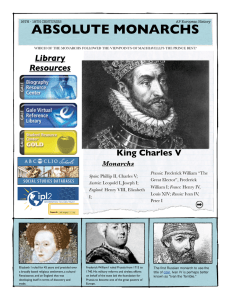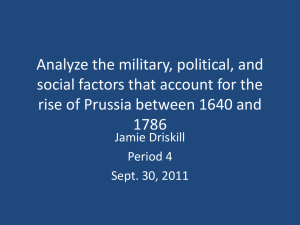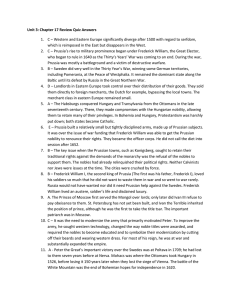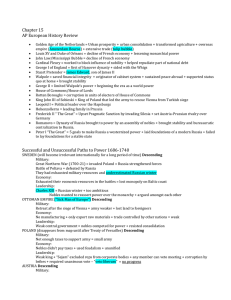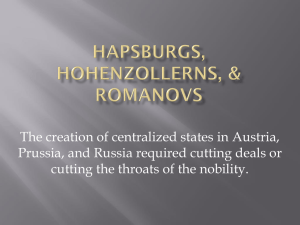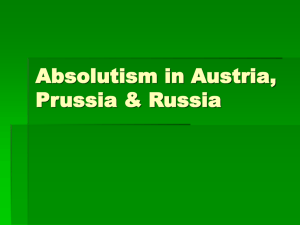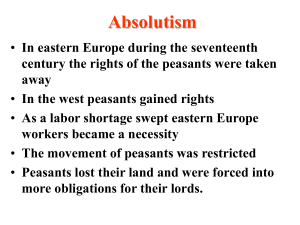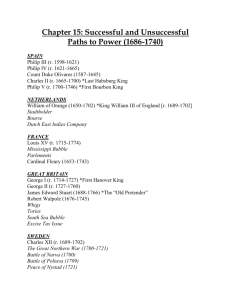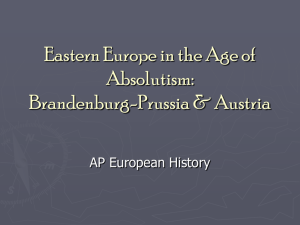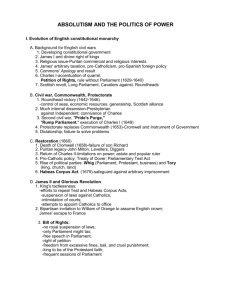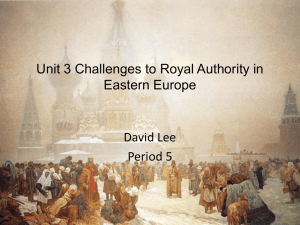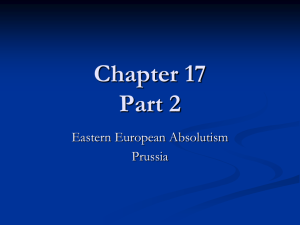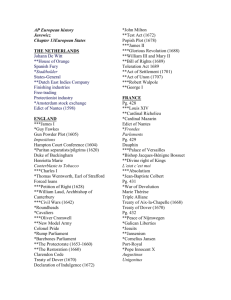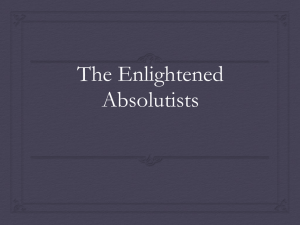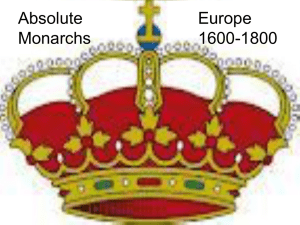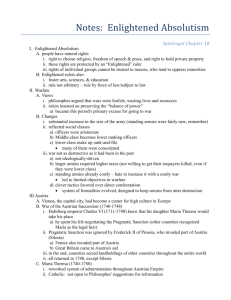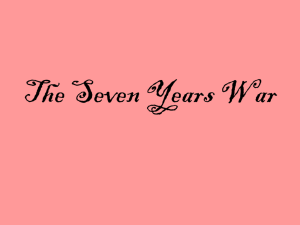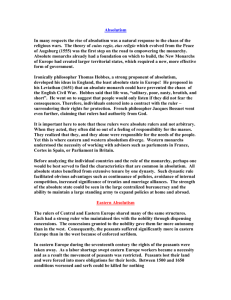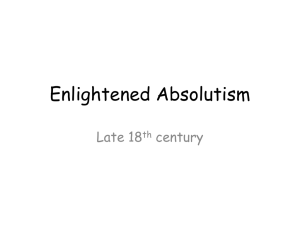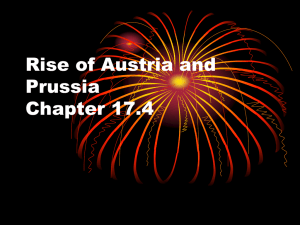Absolutism in Eastern Europe
advertisement
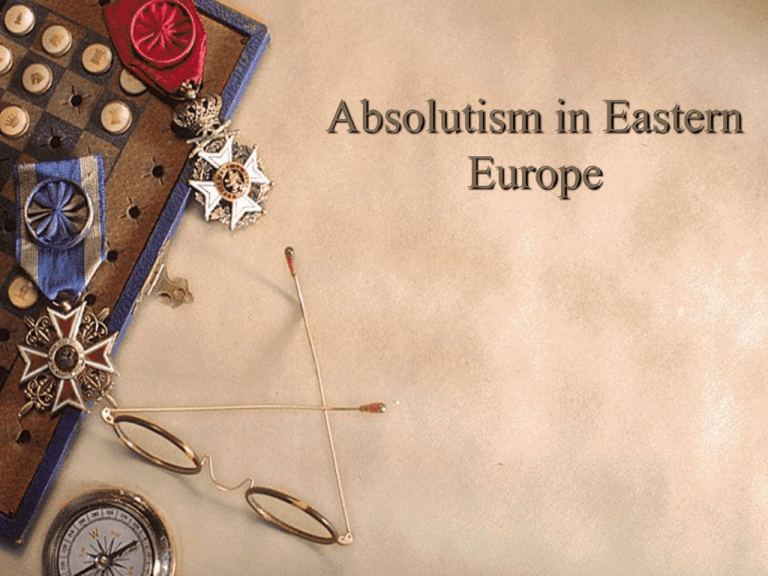
Absolutism in Eastern Europe Austria, Prussia, and Russia Monarchs were in “control” up to 1918 These monarchs will have a powerful impact on culture – Architecture – Arts Unlike the West Powerful Nobility Unlike the West- Nobles were able to suppress the serfs Weak Middle Class Oppressed Peasants-serfs Lords and Peasants in Eastern Europe Serfdom increases in the East Lords created laws that restricted the free movement of peasants – run-a-ways in Prussia had their ears nailed to a post and given a knife to cut themselves free Landlords took more and more of their land and increased labor obligations Local lords were judge and jury Consolidation of Serfdom Poland – Lords could inflict death Prussia (1653 ) Hereditary subjugation Russia – (1649) 9 year time limit on runaways was lifted Increase in Agriculture As European economy expanded, the price of food increased More peasants meant a surplus of local products were sold to foreign markets Was it simply to develop of export markets? No effective Central Government Political rather than economic factors were the difference in the status of serfs. Identical developments caused opposite results in the west. Local nobles held more power over weaker kings and increased their political demands A king in the east was the first among equals Nobles undermined cities power. Products were sold directly to foreign capitalists Importance of urban middle class declined “ no more did town air make one free.” East as least and West as Best Because of social inequalities and harsher economic conditions, the west perceived the east as barbaric and uncivilized. Therefore the east was considered morally inferior which was eventually tied to ethnicity The Ottomans The Rise of Austria and Prussia Toward a Central Government Monarchs gained power in three key areas – Imposed and collected taxes without consent – Created standing armies – Conducted relations with foreign states as they pleased Austria and the Ottoman Turks Devastated by the Thirty Years War The loss made them turn inward Established direct rule over Bohemia The robot… 3 days a week of unpaid labor Protestants were stamped out 1683 – Ottomans are in retreat to the east the Habsburgs take Hungary The Pragmatic Sanction 1713 Habsburg land was divided into three fragile political entities – Austria – Bohemia – Hungary • Rakoczy- Revolt • Defeated 1703 All would be passed to a single heir. Hapsburgs . Hungary accepts Habsburg ruler but is never fully integrated into the Empire. Prussia in the 17th Century The Elector of Brandenburg – had prestige to elect the Holy Roman Emperor, but no military power Estates of princes’ were weakened by the Thirty Years War Frederick William the “Great Elector” – Comes to power 1640 Frederick William The Great Elector [r.1640-1688] The Junkers Landowning nobles that had dominated Prussia Frederick was not resisted in his drive toward absolutism by the nobles “they barked but did not bite” Different than England which had moved to constitutionalism Frederick the Great Elector Introduced permanent taxes without consent Paid for a standing army The size of the army grew ten-fold Two major reasons for success – The invaders to the east demanded a consolidation of forces – Allowed the nobles to continue their rights and privileges over the peasants, but the royal authorities could tax the townspeople Frederick the Ostentatious 1688-1713 Weak in mind and body Man crush on Louis XIV Luxury and petty tyranny Frederick William I “ The Soldier King” 1713-1740 Prussian war psychology- cult of the military- with the Junkers as officers – Best and strongest soldiers – “Dog eat dog” view of world politics – Violent temper – immediate and severe punishments – Obsession for tall soldiers The Prussian Military Grows from 38,000 to 83,000 Amazing discipline and precision Although ready for war, he was usually at peace Tall males were recruited Replaces the Estates with bureaucracy Frederick was austere which made his country economically conscientious Ministers were honest and fair Russia It is a riddle, wrapped in a mystery, inside an enigma … Winston Churchill The Mongol Yoke Russia was forced to pay tribute The Greatest prince was the one that paid the most money Ivan I – “money bags”(r1328-1341) – Collects taxes for the Mongols – Ivan III (r 1462 – 1505) Muscovite princes’ gain authority – Ivan III stops acknowledging Mongols • Fall of Constantinople – holy Russia 1480 Ivan the Terrible(IV) R. 1533-1584 Turns west against the Poland and Lithuanian state Destroys leading Boyars with secret police Purges many other elements of society Greater oppression of the serfs All were servants of the Prince
